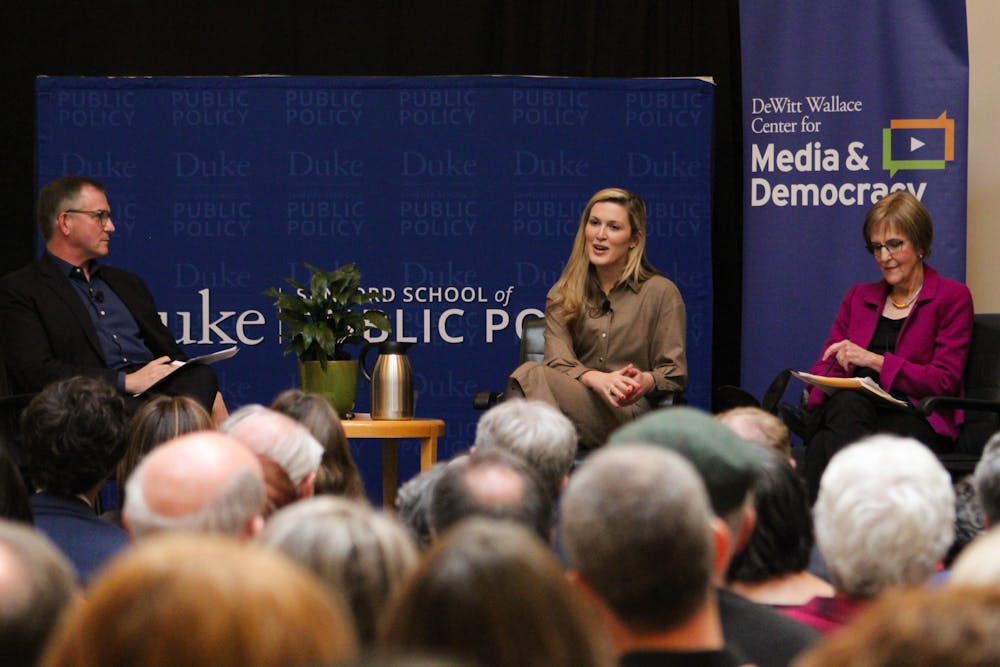The “red wave” that never materialized might have been because the media tends to take hypotheticals and solidifies them into narratives, said Olivia Nuzzi, a New York Magazine reporter, at a Nov. 19 talk.
The discussion at the John Fisher Zeidman Memorial Colloquium on Politics and the Press, hosted by the DeWitt Wallace Center for Media & Democracy, focused around the results of the midterm elections and the future of American politics.
Karen Tumulty, deputy editorial page editor and columnist for The Washington Post, and Nuzzi, Washington correspondent for New York Magazine, discussed the role of polling and predictions in the media coverage of the 2022 midterm elections. Frank Bruni, Eugene C. Patterson professor of the practice of journalism and public policy, moderated the event.
In an interview with The Chronicle, Tumulty told students to “keep voting.” Nuzzi added that students should also “keep listening. I think there's this impulse to perform all the time on social media and to feel like you have to have everything figured out and you have to have a fixed view. But I think that's wrong and should just stay curious.”
The two emphasized that elections are far more uncertain than the media often portrays.
“Everyone has to just admit that they don't know and they couldn't possibly tell you how things are gonna shake out,” Nuzzi said.
Nuzzi elaborated on the media’s tendency to “fill up all of this space” with something “dramatic,” which can lead to hypotheticals solidifying as narratives. She advised journalists to find comfort in uncertainty.
“We shouldn’t be in the prediction business,” she said.
Tumulty noted that in comparison to recent elections mainstream news organizations conducted fewer polls this year. The columnist cited the huge expense as a reason there were only 25 trustworthy Senate polls done by news organizations this cycle, compared to 85 in 2010.
“What we always do in the media is forget there's such a thing as a margin of error,” Tumulty said referring to the polling inaccuracies in 2016. “And that basically what we have are just a whole bunch of very, very close races.”
Only in two election years in modern history has the president’s party picked up seats in the first midterm: 1934 in the middle of the Great Depression and in 2002 following the 9/11 attacks, Tumulty said, emphasizing that the media, which projected that results would swing hard in the Republican party’s favor, often “forget[s] the uncertainty” elections bring.
She also commented on the role of candidate quality in determining election outcomes.
“Political scientists have sort of pounded into a lot of us the idea that candidates don't matter, that elections are preordained by the state of the economy,” she said. Emphasizing the thoughtfulness of voters, she described the increase in split-ticket voting this cycle, where voters voted for “a Democrat in one race and a Republican in the other,” suggesting that voters do consider the quality of candidates when casting their ballot.
“The Republicans just nominated a lot of really disastrous candidates,” she added.
Bruni asked the panelists if they believed the projected red wave was the media’s attempt to “bend over quadrupling backwards to show there is no [liberal] bias.”
“We're so scared to screw it up again by underestimating the right. And people are still so terrified of looking like idiots, looking like you don't know what we're talking about. There’s this tendency to just overcorrect for 2016 that I think is still driving a lot of the decisions and a lot of the behavior in the national media,” Nuzzi responded.
Looking ahead to the 2024 election, particularly former President Donald Trump announcing his bid for the 2024 Republican nomination, Nuzzi said that while she doesn’t know the “right way to write about him,” both panelists agreed that the answer is not to completely forgo covering the former president.
“I don't think that [not reporting] is possible when somebody is seeking a major party's presidential nomination, having already won it twice before — won the nomination, not the election,” Nuzzi said.
As the 2024 election looms ahead, Tumulty told the audience we will be surprised “so many times between now and then.”
Get The Chronicle straight to your inbox
Sign up for our weekly newsletter. Cancel at any time.

Kathryn Thomas is a Trinity junior and new reporter coordinator of The Chronicle's 119th volume. She was previously news editor for Volume 118.

